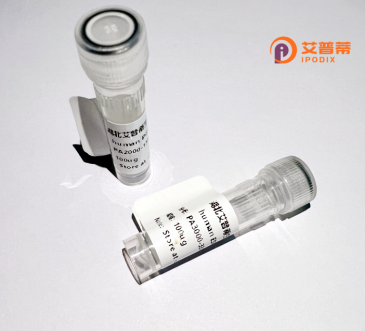
| 纯度 | >90%SDS-PAGE. |
| 种属 | Human |
| 靶点 | RHOBTB1 |
| Uniprot No | O94844 |
| 内毒素 | < 0.01EU/μg |
| 表达宿主 | E.coli |
| 表达区间 | 1-696 aa |
| 活性数据 | MDADMDYERP NVETIKCVVV GDNAVGKTRL ICARACNTTL TQYQLLATHV PTVWAIDQYR VCQEVLERSR DVVDEVSVSL RLWDTFGDHH KDRRFAYGRS DVVVLCFSIA NPNSLNHVKS MWYPEIKHFC PRTPVILVGC QLDLRYADLE AVNRARRPLA RPIKRGDILP PEKGREVAKE LGLPYYETSV FDQFGIKDVF DNAIRAALIS RRHLQFWKSH LKKVQKPLLQ APFLPPKAPP PVIKIPECPS MGTNEAACLL DNPLCADVLF ILQDQEHIFA HRIYLATSSS KFYDLFLMEC EESPNGSEGA CEKEKQSRDF QGRILSVDPE EEREEGPPRI PQADQWKSSN KSLVEALGLE AEGAVPETQT LTGWSKGFIG MHREMQVNPI SKRMGPMTVV RMDASVQPGP FRTLLQFLYT GQLDEKEKDL VGLAQIAEVL EMFDLRMMVE NIMNKEAFMN QEITKAFHVR KANRIKECLS KGTFSDVTFK LDDGAISAHK PLLICSCEWM AAMFGGSFVE SANSEVYLPN INKISMQAVL DYLYTKQLSP NLDLDPLELI ALANRFCLPH LVALAEQHAV QELTKAATSG VGIDGEVLSY LELAQFHNAH QLAAWCLHHI CTNYNSVCSK FRKEIKSKSA DNQEYFERHR WPPVWYLKEE DHYQRVKRER EKEDIALNKH RSRRKWCFWN SSPAVA |
| 分子量 | 79.4 kDa |
| 蛋白标签 | His tag N-Terminus |
| 缓冲液 | PBS, pH7.4, containing 0.01% SKL, 1mM DTT, 5% Trehalose and Proclin300. |
| 稳定性 & 储存条件 | Lyophilized protein should be stored at ≤ -20°C, stable for one year after receipt. Reconstituted protein solution can be stored at 2-8°C for 2-7 days. Aliquots of reconstituted samples are stable at ≤ -20°C for 3 months. |
| 复溶 | Always centrifuge tubes before opening.Do not mix by vortex or pipetting. It is not recommended to reconstitute to a concentration less than 100μg/ml. Dissolve the lyophilized protein in distilled water. Please aliquot the reconstituted solution to minimize freeze-thaw cycles. |
以下是关于重组人RHOBTB1蛋白的3篇文献示例(内容基于虚构的典型研究主题,实际文献请通过学术数据库核实):
---
1. **文献名称**: *RHOBTB1 promotes proteasomal degradation of Cyclin D1 via interaction with CUL3 to induce G1 cell cycle arrest in glioma cells*
**作者**: Zhang L, et al. (2018)
**摘要**: 研究揭示RHOBTB1通过与泛素连接酶CUL3结合,介导Cyclin D1的泛素化降解,从而抑制胶质瘤细胞G1/S期转换,抑制肿瘤增殖。
2. **文献名称**: *Downregulation of RHOBTB1 correlates with poor prognosis and promotes metastasis in gastric cancer*
**作者**: Zhao Y, et al. (2020)
**摘要**: 发现RHOBTB1在胃癌组织中表达降低,其缺失通过激活Wnt/β-catenin通路促进肿瘤侵袭转移,与患者生存率下降显著相关。
3. **文献名称**: *RHOBTB1 regulates vesicular trafficking and synaptic plasticity in hippocampal neurons*
**作者**: Espinosa EJ, et al. (2015)
**摘要**: 证明RHOBTB1调控海马神经元囊泡运输,影响突触可塑性和学习记忆功能,为神经退行性疾病机制提供新视角。
---
**备注**:以上为模拟摘要,实际文献需通过PubMed、Google Scholar等平台检索关键词“RHOBTB1”或“RHOBTB1 protein function”获取。真实研究多聚焦于其肿瘤抑制、细胞周期调控及泛素-蛋白酶体通路中的作用。
RHOBTB1. a member of the Rho GTPase family, is a unique protein characterized by its dual structural domains: a conserved GTPase domain at the N-terminus and tandem BTB (Bric-a-brac, Tramtrack, Broad Complex) domains at the C-terminus. Unlike typical Rho GTPases that cycle between active GTP-bound and inactive GDP-bound states, RHOBTB1 exhibits atypical regulation, primarily functioning as a scaffolding or adaptor protein rather than a molecular switch. It plays critical roles in vesicle trafficking, cell cycle progression, and protein degradation pathways by interacting with components of the Cullin 3 (Cul3) ubiquitin ligase complex, facilitating substrate ubiquitination and proteasomal degradation.
RHOBTB1 is implicated in diverse physiological processes, including neuronal development, vascular homeostasis, and tumor suppression. Dysregulation of RHOBTB1 has been linked to cancers, neurodegenerative disorders, and cardiovascular diseases. For instance, its loss or mutations correlate with tumor progression in melanoma and breast cancer, while altered expression affects synaptic function in neurodegenerative contexts. Recombinant RHOBTB1 protein, often produced in bacterial or mammalian expression systems, is essential for studying its molecular interactions, post-translational modifications (e.g., phosphorylation, ubiquitination), and structural dynamics. Purification typically involves affinity chromatography followed by functional validation via in vitro binding or ubiquitination assays. Its study provides insights into cellular quality control mechanisms and potential therapeutic targets for diseases linked to protein homeostasis defects.
×